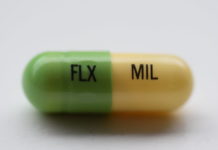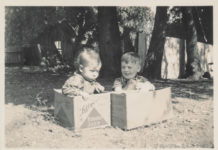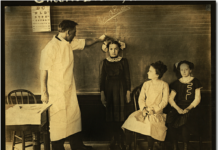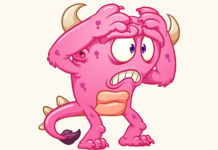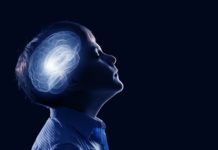William James’s Letter to His Depressed Daughter
If you discover that your child has been experiencing a bout with depression, what wise words might you share? Brilliant psychologist William James was forced to address this issue himself when his 13-year-old daughter, Peg, began to struggle with melancholy. I present his long, thoughtful reply for your consideration.
School-Based Mindfulness Leads to Stress Reduction, Study Finds
Researchers find improvements in stress-related outcomes among middle school students exposed to a school-based mindfulness training program.
Adding Fluoxetine to Therapy Not Superior to Therapy Alone in Depressed Teens
The addition of fluoxetine to CBT did not further reduce depressive symptoms in young people with moderate-to-severe depression.
Craig Wiener – ADHD: A Return to Psychology
On MIA Radio this week, Miranda Spencer, Mad in America's Parent Resources editor, interviews Dr. Craig Wiener, a licensed psychologist who specializes in the treatment of children, adolescents, and families. He discusses approaches to helping children with "ADHD" behavior that don't involve drugs and constant monitoring.
Teacher Perspectives on Student ADHD Medication Use
Qualitative study examines patterns in teacher attitudes and knowledge related to medication of students for ADHD-type behaviors.
Antidepressant Use More Than Doubles Risk of Suicide Attempts
Throughout the past two decades, studies have warned of increased suicide rates in those taking antidepressants, especially in children and adolescents. Researchers also documented...
Traffic Pollution Linked to Anxiety and Depression in Childhood
New research explores the impact of exposure to traffic-related air pollution on levels of anxious and depressive symptoms in childhood.
The Voices My Daughter Hears
The voices were extraordinary; in a way, they were like ghosts. I could not see them, but only divine them by the turmoil they stirred up in Annie. They were not polite house ghosts who knew when to leave; they were ne’er-do-wells she could not get rid of. They were tormentors and torturers, testing the limits of her sanity, blackmailing her into submission.
Parent Training as Effective for Childhood Anxiety as Therapy
Yale study finds that training parents how to react to child behaviors is as effective at reducing anxiety as providing therapy to the child.
Biomedical Model of Mental Illness Creates Stigma for College Students Using Services
A study conducted on college-aged students finds strong correlations between biomedical characterizations of mental illness, pharmaceutical treatment, and social stigma.
Bipartisan “RISE from Trauma Act” Introduced to Address Childhood Trauma in America
The Resilience Investment, Support, and Expansion (RISE) From Trauma Act, legislation designed to increase support for children who have been exposed to Adverse Childhood Experiences, includes $50 million in funding for a “mental health in schools” program. Exactly what these programs would entail remains unclear.
Why Are the Youngest Children in a Classroom Diagnosed with ADHD?
A new article examines the implications of relative age on the ADHD diagnosis.
Letter to My Child’s Psychiatrist
Dear Doctor, I wonder if you remember my son... you only spent about ten minutes with him, exactly four days after his first suicide attempt. I asked you if his medication, Zoloft, had anything to do with what was happening. You looked at me and said, "There's no way of knowing; there are too many factors involved."
Are Mental Health Screenings for Youth Worth the Risk?
Researchers shed light on the limitations of mental health screening instruments for youth that are increasingly being used in schools and medical settings.
Helping Children to Overcome OCD: 6 Creative Strategies for Parents
Here, Dr. Ben Furman offers a creative approach to helping children who struggle with OCD. Explaining why behaviors like reasoning, reassuring, and superstitious rituals don’t work, he suggests engaging alternatives that teach kids how to manage their “worry monster” and make sense of their distressing experience.
FDA Approves Using Electricity All Night Long on Children’s Brains
The FDA just approved sales of an electrical device called the Monarch eTNS to be used on the brains of children diagnosed with so-called ADHD. The device “sends therapeutic signals to the parts of the brain thought to be involved in ADHD,” according to the FDA press release. “Therapeutic signals”? Really?
Yoga and Mindfulness Benefit Youth with Autism Spectrum Disorder
A new review finds preliminary evidence for yoga and mindfulness-based interventions for youth diagnosed with Autism Spectrum Disorder (ASD).
My Son and the “Mental Health” System
As a father whose 27-year-old son is trapped in the mental health system, I am painfully aware that I have been unable to protect him. At age 19, my son naively told his mother and his doctor that he was hearing voices, marking the beginning of a hellish nightmare which he is still unavoidably immersed in. I would like to explain my perspective on why this is the case.
Children Taking ADHD Drugs More Likely to Take Antidepressants as Teens
Adhering to a commonly prescribed medication for ADHD in children is associated with higher chances of being prescribed antidepressants in adolescence.
Teacher Wellbeing Matters for Student Mental Health
Teacher’s personal wellbeing plays a role in students’ mental health outcomes, suggests a new study.
Exposure to Antidepressants in the Womb Linked to Autism
Researchers, publishing in Toxicology Research, review the evidence that antidepressant exposure in the womb is linked to autism spectrum disorders (ASD) in humans.
Exposure to Antidepressants in the Womb Linked to Autistic Behavior in Mice
Researchers experimenting on mice found that exposure to fluoxetine (Prozac) in utero resulted in behaviors considered in animal studies to be analogous to autism in humans.
“Dad, You Were Right”: I Got Better When I Stopped Treatment
Through all the years that I was a mental patient, my parents were excellent advocates who constantly questioned what the docs were doing, even though my own faith in psychiatry was unwavering.... Amazingly, what cured me was not some type of “treatment,” but getting away from drugs and therapy.
More Physical Activity-Based Mental Health Interventions Needed in Schools
What physical activity-based programs are being implemented in schools, how are they being researched, and what kind of impact have they made?
Struggling Parents, Burdened Social Services: What We Can Change
Parents encounter many obstacles when trying to secure adequate educational, medical, psychological, and social supports for their children. These “dense bureaucracies” hurt not just families, but everyone.



